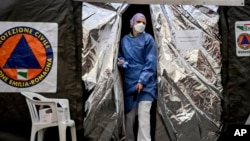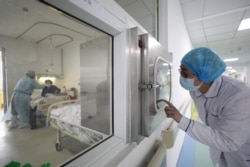What is COVID-19?
COVID-19 is a coronavirus, part of a large family of viruses that include the common cold as well as more severe diseases such as Middle East Respiratory Syndrome (MERS) and severe acute respiratory syndrome (SARS). Coronaviruses look like a ball surrounded by a crown.
How deadly is COVID-19?
COVID-19 is more deadly than influenza, which is not a coronavirus, but kills a smaller percentage of those who become infected than either MERS or SARS. Dr. Anthony Fauci, head of the National Institute of Allergy and Infectious Diseases at NIH, compared death rates from COVID-19 with the flu and with other coronaviruses.
0.1% of people who get a seasonal flu die from complications, compared with around 2.0% of those who get COVID-19. Compare that to the death rate of SARS at 9% to 10% and to MERS, the most lethal at 36%. Fauci says this virus is acting more like the flu in that it spreads more rapidly than SARS did, but the death rate is lower.
How are coronaviruses transmitted?
Coronaviruses are normally transmitted between animals and people. They very often start in bats. Bats are reservoirs of several viruses, including coronaviruses and Ebola, although these viruses don't seem to make bats sick. Over 200 novel coronaviruses have been identified in bats, and both MERS and SARS are thought to have been transferred from bats to camels and from bats to civets, respectively.
What about transmission from one person to another?
A U.S. patient has been confirmed as having the coronavirus although this patient had no contact with others who are infected and did not travel to countries where the virus has spread. No one knows how this person got the virus.
Fauci said there are people who show no symptoms but who have the virus and who very likely can transmit the virus when they are asymptomatic. Fauci said this type of transmission is not driving the outbreak. He said, "It does occur, but it is not the predominant way that it is transmitted."
What does COVID-19 do to a person's body?
COVID-19 is a respiratory virus so it begins and ends in the lungs. There are cases where the virus is so mild, that patient doesn't know he is sick. However, the coronavirus can cause flulike symptoms: fever, cough and shortness of breath that may progress to pneumonia in both lungs.
Why does COVID-19 do so much damage to the lungs?
COVID-19 infects and kills cilia cells, the hairlike cells in your lungs that clear out viruses and pollen. Without cilia cells, your lungs can fill with fluid and other stuff that shouldn't remain in them. COVID-19 also attacks mucus cells. These cells are important because they keep the lungs moist so they can work. Mucus cells protect the lungs from bacteria or viruses.
When lungs are under attack, they alert the body's immune system that then sends immune cells to fight the infection. But sometimes, these immune cells kill everything, including healthy tissue. That's why many sick patients are put on oxygen or, in more severe cases, mechanical ventilation.
Why does COVID-19 attack other organs?
Damaged lungs have a harder time getting oxygen to the bloodstream. Since organs need oxygen to function, if there is none, they can die, starting with the liver, followed by the kidneys.
Why are older adults and those with other illnesses more likely to die?
As we get older, our immune systems get weaker. Smokers may also have a higher risk of becoming very ill or dying since smoking damages the lungs and airways and this virus is a respiratory virus. People with heart disease, diabetes or chronic lung disease have a harder time fighting off the virus and recovering from infections.
The second paragraph of this story has been edited for clarity.





